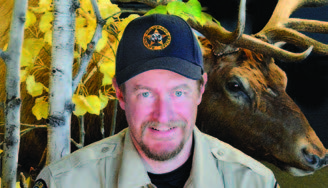Aaron Berscheid is a district wildlife officer for Colorado Parks and Wildlife. Aaron covers the ìwildî side of Northeast El Paso County, including Black Forest, Falcon, Peyton and Calhan. He also covers some of Elbert County, north of U.S. Highway 24 and south of State Highway 86, including the towns of Elbert, Kiowa, Ramah, Simla, Matheson and a small portion of the Limon area.
†You may be sick of hearing it, but I have a really important new reason not to leave bird feeders out: a new Avian Flu is spreading through wild bird populations.†Please do not start panicking, though. This is not the next COVID.†Avian flu is a disease that primarily affects wild bird populations and domestic birds. So far, there has only been one known case of this influenza strain that has crossed to humans. In that case, the infected bird farmer was asymptomatic.†But avian flu is something you need to pay attention to, especially if you have or raise domestic birds. So far, avian flu is having its biggest impact on waterfowl, birds of prey that feed on waterfowl, songbirds and domestic birds like turkeys and chickens.Just like other influenza viruses, we have to pay attention to how avian flu is spread. Close contact with other birds is the main source of spread. This is why songbirds and other birds congregating around feeders is a bad idea.†The more birds gather together at feeders, the higher the likelihood we are helping spread the disease.†So please help stop the spread of avian flu by taking down your bird feeders.†I know how hard this is. Who doesnít like seeing bright songbirds, Stellarís jays, Western tanagers, American goldfinches and all the other birds that brighten our lives with their displays of colors and their distinctive songs?But isnít it more important to protect these birds you like to watch?So please put away your feeders (after you give them a thorough washing).†You donít have to give up birds altogether. You can attract them with a well-planned garden. Plant cheerful flowers like asters from the sunflowers and daisy family, or a butterfly bush, or Chrysothamnus (rabbitbrush) and milkweed.The birds will come but they wonít stand beak-to-beak as they do at your feeders.By the way, if you feel that a bird is sick or you have found multiple birds dead in a certain area, please contact CPW to have the birds tested. Please do not touch these birds.†Thereís a lot more information available about avian flu, and I encourage you to learn more. Please visit the following website for more information:†https://cpw.state.co.us/Documents/Wildlife-Health/HPAI-highly-pathogenic-avian-influenza.pdf#search=avian%20fluIn the coming months, Iíll share more of those stories as I write about wildlife issues in our community: Got a question, problem or column idea, please email me at aaron.berscheid@state.co.us or call me at 719-227-5231.†I might even answer your question in a future installment of ìWildlife Matters.î




